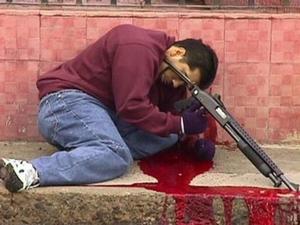MexicoDrug violence causing U.S. firms to reconsider Mexican investments
As the Mexican government’s battle against drug cartels rages on, U.S. businesses and their employees have become increasingly caught up in the crossfire, which has led many to reconsider investing in Mexico; a recent survey of U.S. companies by the U.S.— Mexico Chamber of Commerce found that only half were planning on moving ahead with investment plans in Mexico; U.S. companies and their workers have become increasingly caught up in the war as collateral damage as well as targets for kidnapping and extortion; in 2010 one out of ten companies reported kidnappings and 60 percent said that their employee had been beaten or threatened by the cartels

Drug war violence rages on // Source: morrisonworldnews.com
As the Mexican government’s battle against drug cartels rages on, U.S. businesses and their employees have become increasingly caught up in the crossfire, which has led many to reconsider investing in Mexico.
A recent survey of U.S. companies by the U.S.– Mexico Chamber of Commerce found that only half were planning on moving ahead with investment plans in Mexico. In addition, several large companies like Whirlpool Corp., have decided to build new factories in other countries due to safety concerns. Earlier this month during a gun battle between the Mexican army and drug traffickers near the city of Monterrey, a stray grenade tore through a bus carrying dozens Mattel Inc. employees on their way to work at the Power Wheels factory. The battle left one worker dead and five more injured.
“These acts of violence are not happening in a vacuum; they’re happening in the street that could be right out in front of your building. Bullets get shot and they have to stop somewhere,” said Dan Burges, a senior director at Freightwatch Inc., a cargo security firm based in Austin.
Since President Felipe Calderon launched his campaign against the drug cartels, more than 35,000 people have died from drug-related violence.
U.S. companies and their workers have become increasingly caught up in the war as collateral damage as well as targets for kidnapping and extortion.
According to the U.S.-Mexico Chamber of Commerce, in 2010 one out of ten companies reported kidnappings and 60 percent said that their employee had been beaten or threatened by the cartels.
In addition cargo theft has increased dramatically. Statistics from the National Multimodal Transport Alliance indicate that last year thieves stole more than $700 million in cargo from businesses, a 40 percent increase over the past few years.
In recent years cargo thieves have become bolder stealing entire trailer loads of freshly built cars as they were being transported on major highways. Things have become so dangerous that many truck drivers now refuse to drive through dangerous areas like Ciudad Juarez, where 3,000 people were murdered in 2010 alone.
To ensure that their cargo passes through safety, many businesses in Mexico are forced to strike deals with organized crime syndicates.
“It’s a well-known practice that many Mexican producers and shippers pay a certain percentage so they can get their goods through parts of Mexico without having them ripped off,” said a senior U.S. official in Mexico, who spoke anonymously due to security concerns.
Despite the dangers and the economic losses, most U.S. companies say they have no plans to leave as Mexico offers a cheap labor supply, lax environmental standards, tax incentives, and close proximity to the United States.
Keith Partridge, who helps promote businesses on both sides of the border, said, “People think that everything in Mexico is a constant shootout, but that’s not the case.”
He added, “We’re a city, a metropolitan area, that happens to span the border. The south side of our city happens to have labor that is among the most competitive in the world. The north side of town is the largest market in the world.”
Every day more than $1 billion worth of goods crosses the U.S.-Mexico border and more than 18,000 U.S. firms have operations in Mexico, including the majority of Fortune 500 companies.
But Gabriel Casillas, the chief economist for Mexico at J.P. Morgan says that these numbers could be much higher. Casillas estimates that last year the violence from Mexico’s drug wars resulted in the loss of $4 billion in foreign direct investment.
This loss in investment has affected Partridge’s business. In the past, Partridge typically helped twenty to thirty U.S. firms establish operations in Mexico. In 2010 he only helped five.
